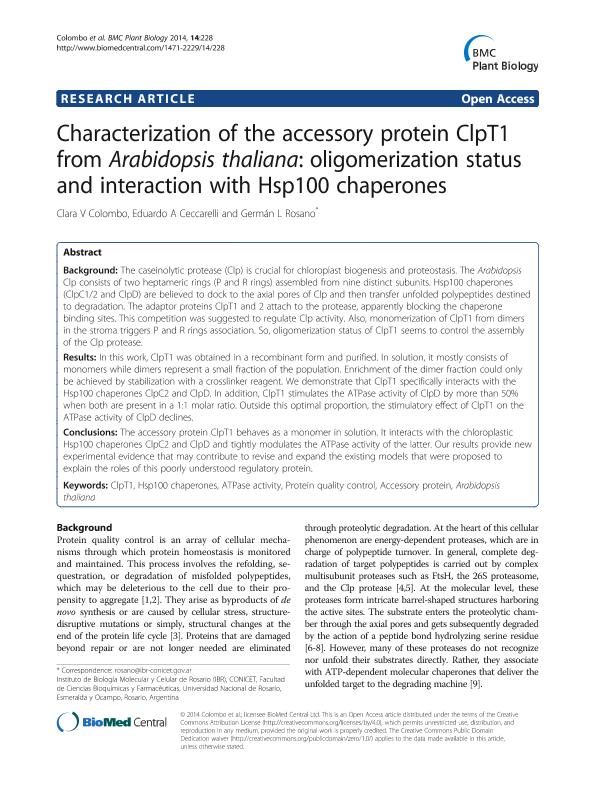Mostrar el registro sencillo del ítem
dc.contributor.author
Colombo, Clara Victoria

dc.contributor.author
Ceccarelli, Eduardo Augusto

dc.contributor.author
Rosano, German Leandro

dc.date.available
2016-12-05T19:57:06Z
dc.date.issued
2014-08
dc.identifier.citation
Colombo, Clara Victoria; Ceccarelli, Eduardo Augusto; Rosano, German Leandro; Characterization of the accessory protein ClpT1 from Arabidopsis thaliana: oligomerization status and interaction with Hsp100 chaperones; Biomed Central; Bmc Plant Biology; 14; 228; 8-2014; 1-10
dc.identifier.issn
1471-2229
dc.identifier.uri
http://hdl.handle.net/11336/8814
dc.description.abstract
El presente articulo se encuentra aceptado con modificaciones. Background: The caseinolytic protease (Clp) is crucial for chloroplast biogenesis and proteostasis. The Arabidopsis Clp consists of two heptameric rings (P and R rings) assembled from nine distinct subunits. Hsp100 chaperones (ClpC1/2 and ClpD) are believed to dock to the axial pores of Clp and then transfer unfolded polypeptides destined to degradation. The adaptor proteins ClpT1 and 2 attach to the protease, apparently blocking the chaperone binding sites. This competition was suggested to regulate Clp activity. Also, monomerization of ClpT1 from dimers in the stroma triggers P and R ring association. So, oligomerization status of ClpT1 seems to control the assembly of the Clp protease. Results: In this work, ClpT1 was obtained in a recombinant form and purified. In solution, it mostly consists of monomers while dimers represent a small fraction of the population. Enrichment of the dimer fraction could only be achieved by stabilization with a crosslinker reagent. We demonstrate that ClpT1 specifically interacts with the Hsp100 chaperones ClpC2 and ClpD. In addition, ClpT1 stimulates the ATPase activity of ClpD by more than 50% when both are present in a 1:1 ratio. Outside this optimal proportion, the stimulatory effect of ClpT1 on the ATPase activity of ClpD declines. Conclusions: The accessory protein ClpT1 behaves as a monomer in solution. It interacts with the chloroplastic Hsp100 chaperones ClpC2 and ClpD and tightly modulates the ATPase activity of the latter. Our results provide new experimental evidence that may contribute to revise and expand the existing models that were proposed to explain the roles of this poorly understood regulatory protein.
dc.format
application/pdf
dc.language.iso
eng
dc.publisher
Biomed Central

dc.rights
info:eu-repo/semantics/openAccess
dc.rights.uri
https://creativecommons.org/licenses/by/2.5/ar/
dc.subject
Clpt1
dc.subject
Hsp100 Chaperones
dc.subject
Atpase Activity
dc.subject
Protein Quality Control
dc.subject
Accessory Protein
dc.subject
Arabidopsis Thaliana
dc.subject.classification
Bioquímica y Biología Molecular

dc.subject.classification
Ciencias Biológicas

dc.subject.classification
CIENCIAS NATURALES Y EXACTAS

dc.title
Characterization of the accessory protein ClpT1 from Arabidopsis thaliana: oligomerization status and interaction with Hsp100 chaperones
dc.type
info:eu-repo/semantics/article
dc.type
info:ar-repo/semantics/artículo
dc.type
info:eu-repo/semantics/publishedVersion
dc.date.updated
2016-11-24T19:37:26Z
dc.journal.volume
14
dc.journal.number
228
dc.journal.pagination
1-10
dc.journal.pais
Reino Unido

dc.journal.ciudad
Londres
dc.description.fil
Fil: Colombo, Clara Victoria. Consejo Nacional de Investigaciones Científicas y Técnicas. Centro Científico Tecnológico Rosario. Instituto de Biología Molecular y Celular de Rosario; Argentina
dc.description.fil
Fil: Ceccarelli, Eduardo Augusto. Consejo Nacional de Investigaciones Científicas y Técnicas. Centro Científico Tecnológico Rosario. Instituto de Biología Molecular y Celular de Rosario; Argentina
dc.description.fil
Fil: Rosano, German Leandro. Consejo Nacional de Investigaciones Científicas y Técnicas. Centro Científico Tecnológico Rosario. Instituto de Biología Molecular y Celular de Rosario; Argentina
dc.journal.title
Bmc Plant Biology

dc.relation.alternativeid
info:eu-repo/semantics/altIdentifier/doi/http://dx.doi.org/10.1186/s12870-014-0228-0
dc.relation.alternativeid
info:eu-repo/semantics/altIdentifier/url/http://bmcplantbiol.biomedcentral.com/articles/10.1186/s12870-014-0228-0
Archivos asociados
